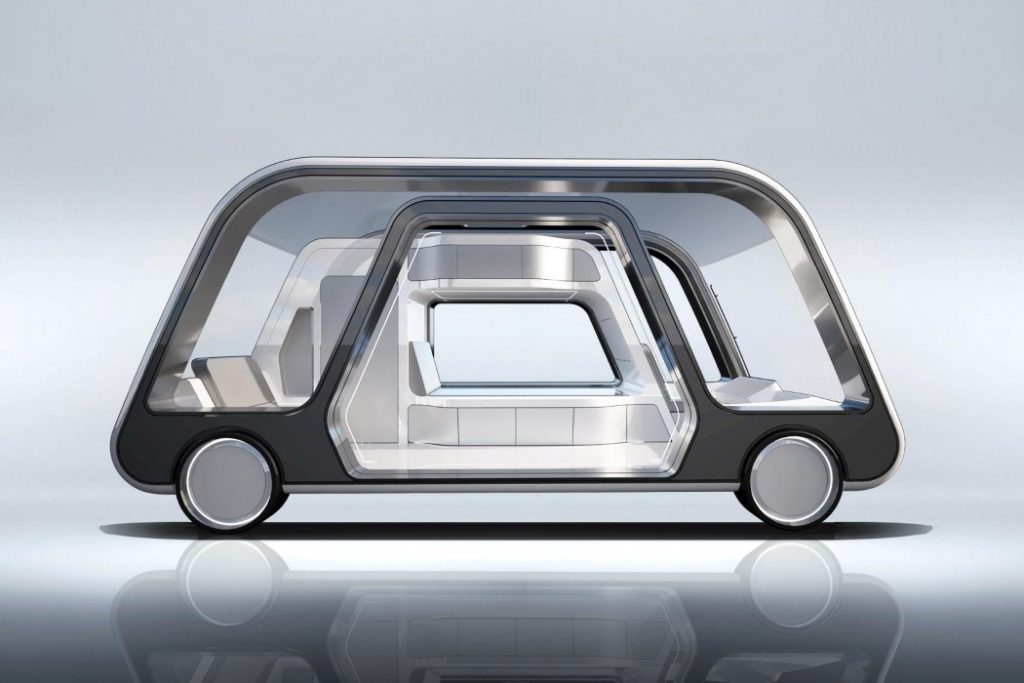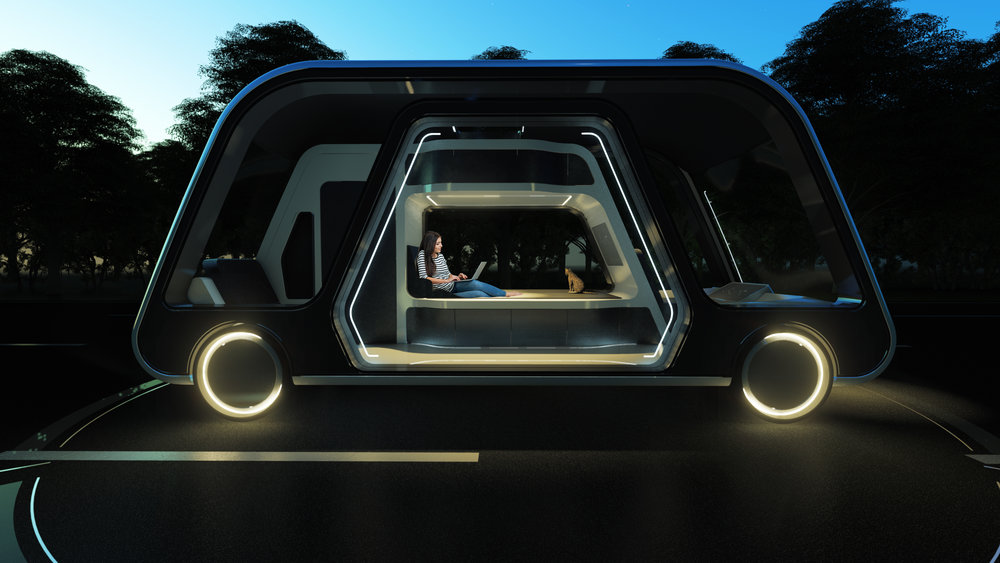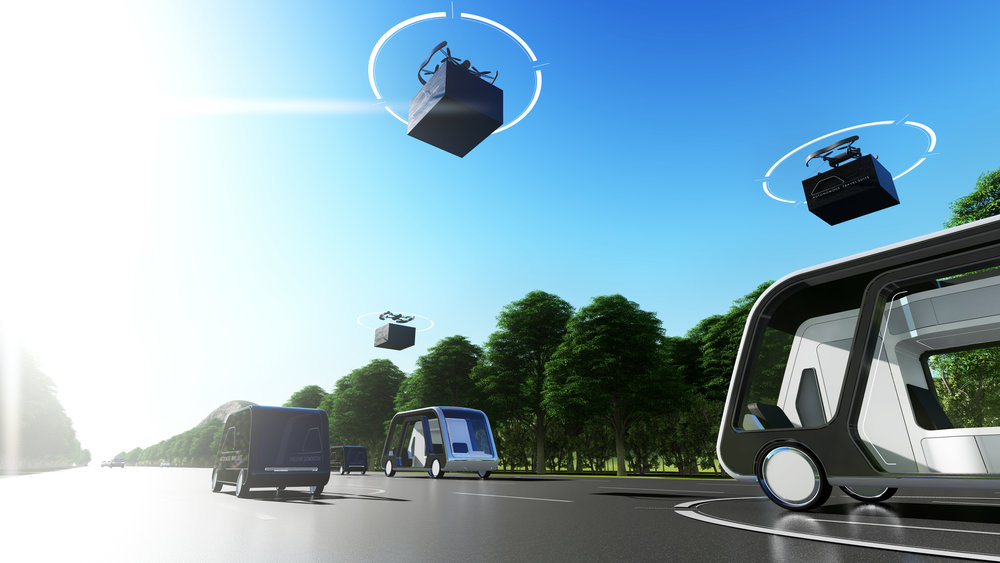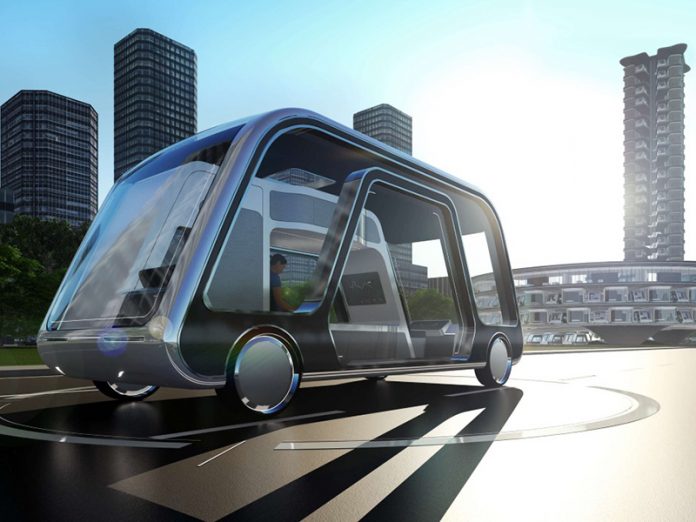By Steve Lee, Won-Yong Oh, Irene Yi
There has been increasing attention to self-driving cars, but business is still missing some key insights into how it will disrupt the industry landscape. This article shows how autonomous driving technology will disrupt several related industries, and proposes that “transpitality” (transportation + hospitality) will emerge as one of the new forms of business.
What Could Future Travel Look Like?
The following is a scenario of what future travel could look like.
Jennifer, who lives in Las Vegas with her husband and daughter, is planning a business trip to San Francisco the next morning. She decides to use Autonomous Mobile Hotel, a specialised travel vehicle operated by the Autonomous Hotel Group. Using an app on her smartphone, she types in her itinerary and selects a single-occupancy mobile room. Expecting that she’ll want a little down time before and after her meeting, she also reserves a 4-hour docking station at the Autonomous Hotel San Francisco.
After having dinner with her family, Jennifer loads her luggage into the Autonomous Mobile Hotel, which has arrived on schedule and is waiting in front of her house. While the Autonomous Mobile Hotel drives her to San Francisco, Jennifer makes use of the time to work on her presentation, then relaxes and gets some sleep, just as she would do at home. A screen live-projecting her husband reading bedtime stories to their daughter makes her feel perfectly connected to home. Once the Autonomous Mobile Hotel arrives at the Autonomous Hotel in San Francisco, it automatically docks into a docking station forming a larger integrated unit. With access to all of the Autonomous Hotel amenities, Jennifer feels secure and relaxed.
[ms-protect-content id=”9932″]
The next morning, the Autonomous Mobile Hotel drives Jennifer to her business meeting, giving her a bit more time to polish her presentation. After dropping her off at the meeting location, the Autonomous Mobile Hotel returns to the Autonomous Hotel for housekeeping, and stands by for Jennifer’s call. Later that afternoon, when Jennifer’s meeting is over, the Autonomous Mobile Hotel picks her up and starts the drive back to Las Vegas. With her presentation successfully behind her, Jennifer stretches out and relaxes, enjoying the scenic views and taking in a couple of movies.


Transpitality: A New Form of Business
The emergence of autonomous driving technology marks the arrival of a new era. There are two advantages of self-driving vehicles. First, they can self-drive for extremely long hours and distances without getting tired or being hampered by poor night vision. Second, they can make multiple door-to-door trips without having ‘first mile/last mile’ problems. These advantages make autonomous vehicles ideal platforms for long-distance travel. What has been overlooked is how this technological advancement will redefine what an automobile is, and how related industries should rethink their scope of businesses accordingly.
Transpitality, a word integrating transportation and hospitality, will become a new type of business utilising autonomous vehicles in the future. There will be new demands for various kinds of services including food & beverage, entertainment, infotainment, room service and maintenance, as travellers will choose to use their time more productively while travelling inside autonomous vehicles.
Autonomous driving technology, along with other emerging technologies such as Artificial Intelligence, Big Data, 5G and the Internet of Things (IoT), will create new opportunities in the future and this will change the landscape of related industries, creating threats to some industries and opportunities for others.
Aprilli, a Toronto-based design studio, is the first to propose the concept of Transpitality, the idea of a mobile hotel room based on autonomous driving technology: the Autonomous Travel Suite. The idea, which won the 2018 Radical Innovation Award’s grand prize, is of a transportation vehicle and a hotel room combined. Designed like hotel guestrooms and equipped with sleeping and working areas and a washroom facility, the Autonomous Travel Suite provides more comfort and privacy than flying, driving or taking the train, letting travellers use their travel time more efficiently and productively and in a more convenient and cost-efficient way.


How Would Autonomous Driving Technology Disrupt Related Industries
•Automotive
When autonomous driving technology becomes commercialised, an automobile will be redefined as an interior space, rather than a means of transportation. As the driver will no longer be needed, the interior and exterior of a vehicle will need to evolve to increase space efficiency and to better support the passenger experience. The vehicle will be equipped with various features such as washroom units, work desks, video monitors, a minibar, storage and even beds. Car makers’ success will depend on how they design the passenger experience rather than on simply improving fuel efficiency or mechanical aspects. It will be necessary to develop products according to consumers’ specific needs (e.g., an entertainment car), rather than focussing on car size and type (e.g., a luxury sedan). For example, automobile companies will need to develop a car that maximises the rest function, suits the work environment or emphasises the entertainment function. Automobile companies might even have to design dual modes – driving mode and sleeping mode – to accommodate a customer’s different needs.
•Domestic Airlines
The airline industry, especially domestic airlines, is likely to be threatened by autonomous mobile hotel rooms. Compared to domestic flights, which require check-in, security screening, multiple transfers (with potential delays or cancellations) and travel to and from the airport, these new mobile hotel rooms can be operated as a door-to-door rental car and hotel room in one, providing unlimited flexibility and mobility. For business travel within a 4- to 10-hour driving distance, or travels requiring multiple stops, the autonomous mobile hotel rooms will be a much more convenient option with lower cost and better connectivity. Therefore, the airline industry should provide answers to the following fundamental questions: “Why would passengers continue to fly, given the low efficiency in terms of time and budget?” and “Will self-driving technology disrupt the entire business of domestic airlines?”
•Hospitality
Conventional hotel operators will face competitive challenges from autonomous hotel rooms equipped with a transportation function. Unlike the past, when accessibility to mass transportation or city centres was important, hotels in highly congested areas will lose their attractiveness.
At the same time, the hospitality industry can identify opportunities because it can expand its traditional scope of hospitality to include transportation and mobility. Large hotel chains can redesign some of their spaces to become “stations” for customers travelling with autonomous vehicle while they are in transit. Hotels in static locations can provide parent units into which mobile hotel units can dock, to form an integrated unit, for better comfort and access to upscale hotel facilities. These stations would give travellers access to food and beverages, a spa, a pool, a gym and meeting rooms, along with housekeeping services and maintenance of the mobile hotel units, just like any conventional hotel could offer. The boundaries of hospitality will become less clear as Transpitality becomes a new form of business.
[/ms-protect-content]
About the Authors
 Steve Lee is the Founder and Design Principal at Aprilli Design Studio, a Toronto-based design consulting firm. He has previously taught at UCLA and California Polytechnic State University and has received his master’s degree from Yale School of Architecture.
Steve Lee is the Founder and Design Principal at Aprilli Design Studio, a Toronto-based design consulting firm. He has previously taught at UCLA and California Polytechnic State University and has received his master’s degree from Yale School of Architecture.
 Won-Yong Oh is Lee Professor of Strategy at the Lee Business School, University of Nevada, Las Vegas in the USA.
Won-Yong Oh is Lee Professor of Strategy at the Lee Business School, University of Nevada, Las Vegas in the USA.
 Irene Yi is an Assistant Professor of Finance at the Rotman School of Management, University of Toronto.
Irene Yi is an Assistant Professor of Finance at the Rotman School of Management, University of Toronto.





































